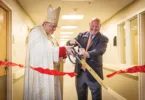by Richard Meek
BATON ROUGE, La. (CNS) — Families living with families.
That’s not an uncommon occurrence after a disaster, especially in southeast Louisiana where ties among extended families and even friends are indigenous to the culture. So it’s no surprise that as recent flood waters receded, those families not affected heartily swung open their doors and hearts to displaced family members.
Consequently, a family of four living in a modest home might now be housing eight to 10 people in those same quarters, which suddenly seemed to shrink overnight.
But the generosity of the host families is inherent with potential potholes as the novelty of the first few days settles into the everyday meshing of two family units under a single roof.
“First of all it is important to recognize that [the guest family] is grieving,” said Daryl Ducote, director of the Office of Marriage and Family Life for the Diocese of Baton Rouge. “With grief comes depression and anger.
“And so they may not be aware that some of the feelings being expressed in rubbing elbows with extended family is really a spillover from what is happening internally as they are trying to manage feelings of grief over what they lost,” he told The Catholic Commentator, the diocesan newspaper. “That grief in terms of sadness and anger gets displaced onto the people around them.”
Ducote, who spent many years in private practice as a family therapist, said it is important for the host family to not take personally anything said out of anger and to show patience with their new guests. However, he was quick to point out that the visiting family is not granted a free pass, saying those family members must recognize that some of their actions will be out of place or inappropriate.
The second stressor, Ducote said, is recognizing a family is a system and combining two systems into one is not always an easy transition. He said sensitivity is a necessity and adults must negotiate roles, responsibilities and needs within the two systems.
More than six weeks after southern Louisiana was devastated by heavy rains in mid-August and the catastrophic flooding that resulted, the critical work of rebuilding is ongoing. The storms killed 13 people and caused at least $8.7 million in damages. The Federal Emergency Management Agency reported that more than 134,000 households have registered for aid and 115,000 housing inspections have been completed.
According to FEMA, finding enough temporary housing for flood victims has been a challenge and hundreds of people have had to remain in their ruined homes.
“Every [family] system has its own equilibrium,” Ducote said of those living under the same roof. “It operates in a way that maintains stability and when you put two different systems together there’s a period of chaos while the two systems are trying to figure out how they are going to create a new system. Something new for the time being even though it is temporary.”
Ducote said that equilibrium will not happen by accident but has to be a conscious effort by all parties. An amiable transition requires the adults taking the leadership roles and not allowing the children to dictate what is going to happen. He said the transition can be difficult for children, who may find they have to live under a different set of house rules to which they are accustomed.
“It’s important for the guest adults to recognize that the authority really belongs to the host adults,” Ducote said. “It’s their home and their rules. There may be some room for temporary compromise, but ultimately it’s the host adults that set the rules.
“You are on somebody else’s turf and they have the authority.”
Ducote advised the families living together to make sure each has their own separate time, including privacy for the adults, and use what he called “heroic patience” among everyone involved because it is a difficult situation. He said feelings are raw and the guest family is riddled with grief, depression and anxiety.
He added that it was important to quickly repair the damage that may arise from hurtful comments or even inappropriate behavior.
“Repair becomes extremely important,” Ducote said.
He recommended that the guest family continue to maintain its faith and spirituality and recognize that God has not abandoned them. He said the family must call upon God both individually and as a family to pray and ask for the strength to deal with the changes and struggles they are having to face.
Doing so might require the guest family to be creative in their approach, such as taking time as a family and retreating into the living room to pray together.
Ducote noted that kids are adaptable to change easier than adults but parents should be aware of any significant behavioral changes. For example, if a normally active child is quiet or lethargic that might suggest a warning sign that needs to be addressed.
“And most of the time that can be addressed simply by a parent talking to a child,” he said. “If a child has difficulty expressing what is going on, the parent can guess at what is happening and voice what they think is happening and see how the child responds. The child can say, ‘Yes’ or ‘No’ and say, ‘I’m feeling this instead.'”
“I think it’s a difficult time, but I don’t think it’s traumatizing because kids are very adaptable,” added Ducote. “Parents must remind them this is a temporary situation. This is not permanent.”






